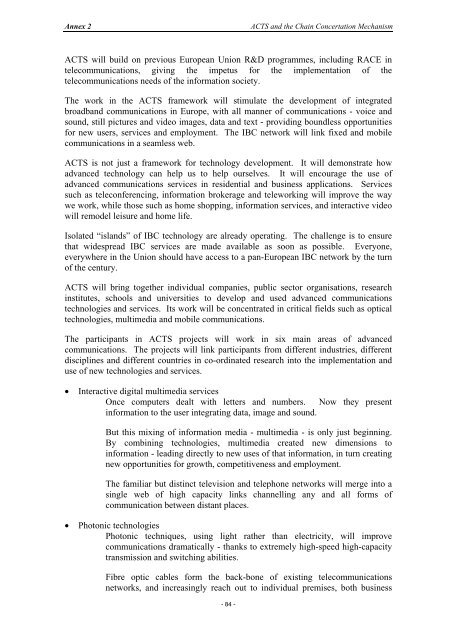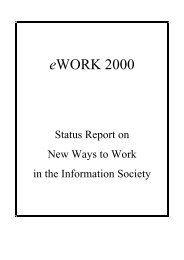1996 - European Telework Week
1996 - European Telework Week
1996 - European Telework Week
- No tags were found...
You also want an ePaper? Increase the reach of your titles
YUMPU automatically turns print PDFs into web optimized ePapers that Google loves.
Annex 2<br />
ACTS and the Chain Concertation Mechanism<br />
ACTS will build on previous <strong>European</strong> Union R&D programmes, including RACE in<br />
telecommunications, giving the impetus for the implementation of the<br />
telecommunications needs of the information society.<br />
The work in the ACTS framework will stimulate the development of integrated<br />
broadband communications in Europe, with all manner of communications - voice and<br />
sound, still pictures and video images, data and text - providing boundless opportunities<br />
for new users, services and employment. The IBC network will link fixed and mobile<br />
communications in a seamless web.<br />
ACTS is not just a framework for technology development. It will demonstrate how<br />
advanced technology can help us to help ourselves. It will encourage the use of<br />
advanced communications services in residential and business applications. Services<br />
such as teleconferencing, information brokerage and teleworking will improve the way<br />
we work, while those such as home shopping, information services, and interactive video<br />
will remodel leisure and home life.<br />
Isolated “islands” of IBC technology are already operating. The challenge is to ensure<br />
that widespread IBC services are made available as soon as possible. Everyone,<br />
everywhere in the Union should have access to a pan-<strong>European</strong> IBC network by the turn<br />
of the century.<br />
ACTS will bring together individual companies, public sector organisations, research<br />
institutes, schools and universities to develop and used advanced communications<br />
technologies and services. Its work will be concentrated in critical fields such as optical<br />
technologies, multimedia and mobile communications.<br />
The participants in ACTS projects will work in six main areas of advanced<br />
communications. The projects will link participants from different industries, different<br />
disciplines and different countries in co-ordinated research into the implementation and<br />
use of new technologies and services.<br />
• Interactive digital multimedia services<br />
Once computers dealt with letters and numbers. Now they present<br />
information to the user integrating data, image and sound.<br />
But this mixing of information media - multimedia - is only just beginning.<br />
By combining technologies, multimedia created new dimensions to<br />
information - leading directly to new uses of that information, in turn creating<br />
new opportunities for growth, competitiveness and employment.<br />
The familiar but distinct television and telephone networks will merge into a<br />
single web of high capacity links channelling any and all forms of<br />
communication between distant places.<br />
• Photonic technologies<br />
Photonic techniques, using light rather than electricity, will improve<br />
communications dramatically - thanks to extremely high-speed high-capacity<br />
transmission and switching abilities.<br />
Fibre optic cables form the back-bone of existing telecommunications<br />
networks, and increasingly reach out to individual premises, both business<br />
- 84 -








